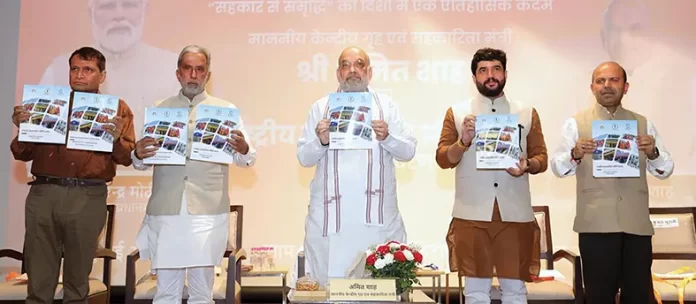Staff Reporter
NEW DELHI, 24 Jul: Union Cooperation Minister Amit Shah on Thursday unveiled the National Cooperation Policy (NCP)-2025 in New Delhi.
Unveiling the policy, Shah said that the NCP is a historic step towards realising Prime Minister Narendra Modi’s vision of ‘Sahkar Se Samriddhi’, adding that the policy is visionary, practical and result-oriented.
Highlighting the objectives of the policy, the minister said that, while formulating the cooperation policy, it was ensured that its core focus remained on the development of 1.4 billion people of India, especially villagers, agriculture farmers, rural women, Dalits, and tribals.
He informed that the vision of the new cooperation policy is to build a Viksit Bharat by 2047 through ‘Sahkar Se Samriddhi’. He further explained that the mission of the policy is to promote small cooperative units that are professional, transparent, technology-enabled, accountable, economically self-reliant, and successful, and to ensure that at least one cooperative unit is established in every village.
He emphasized that only the cooperative sector has the capacity to develop the nation’s economy inclusively with contributions from all 1.4 billion citizens. He said that the cooperative sector has a unique capability to pool small amounts of capital from many individuals to create large-scale enterprises.
Shah further said that six pillars have been defined to achieve the set goals for the cooperative sector. These are: strengthening the foundation; promoting vibrancy; preparing cooperative societies for the future; enhancing inclusivity and expanding reach; expanding into new sectors; and preparing the younger generation for cooperative development.
“There was a time when people used to say that cooperation had no future. Today, I say that the future belongs to cooperation only,” Shah said.
He said that a target has been set to triple the contribution of the cooperative sector to the country’s GDP by the year 2034. He acknowledged that this is a significant goal, but added that comprehensive preparations have been made to achieve it. A major objective is to bring 50 crore citizens, who are either not members or are inactive in the cooperative sector, into active participation. Additionally, there is a target to increase the number of cooperative societies by 30 percent.
Currently, there are 8.3 lakh cooperative societies, and this number will be increased by 30 percent.
Former union minister Suresh Prabhu led the 40-member committee to draft the comprehensive cooperation policy after holding dialogues with various stakeholders. The committee conducted regional workshops and held extensive discussions with cooperative leaders, experts, academicians, ministries, and all other stakeholders to draft the policy. It is learnt that the committee received about 750 suggestions, held 17 meetings, and, after consultations with the RBI and the NABARD, finalized the policy.
Union MoS for Cooperation Krishan Pal Gurjar, Murlidhar Mohol, Cooperation Secretary Dr Ashish Kumar Bhutani, and many other dignitaries were present on the occasion. (With inputs from PIB)



